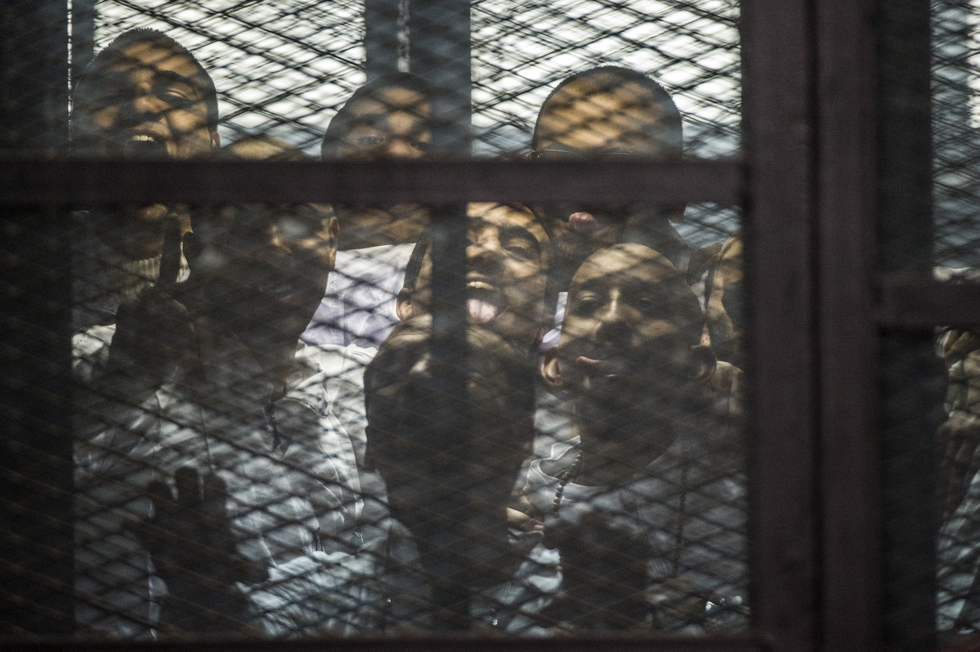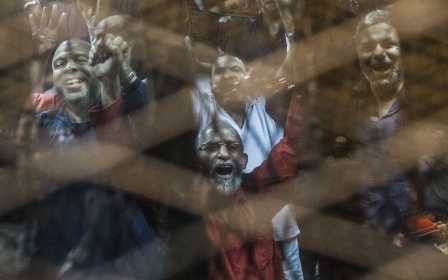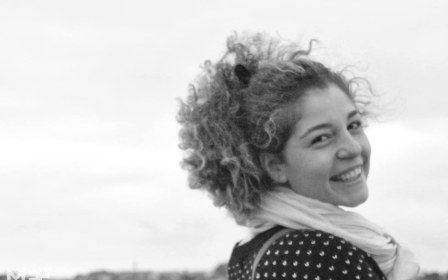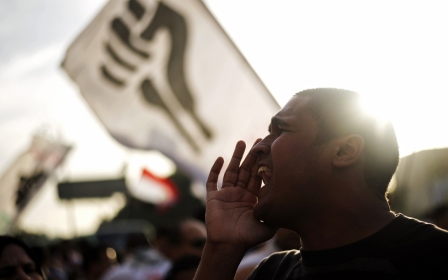Human rights lawyer denied entry to Cairo's Scorpion prison

A leading human rights lawyer was denied entry on Tuesday to Cairo's Scorpion Prison, where recent reports have revealed many political prisoners have been subject to severe torture.
The delegation of the National Council for Human Rights (NCHR), led by international human rights lawyer Ragia Omran, had requested access to the prison to check on the prisoner welfare after several reports found inhumane conditions and widespread torture.
“We have been asking since November for preparations for a visit to Aqrab [Scorpion] prison to begin,” Omran told Egyptian newspaper Mada Masr.
“As the flow of reports on torture inside kept increasing, we also demanded the release of a statement [on behalf of the council] condemning this torture.” The NHCR is a semi-official human rights body set up in 2003 and linked to the now dissolved Shura Council.
Authorities reportedly told Omran upon arriving at the prison that her name was not listed in the visitation records, Omran told Mada Masr.
Omran insists she had notified the head of the delegation and that it had been cleared to enter.
While other members of the delegation were allowed into Scorpion, they were denied any meetings with prisoners or visits to cells, a member of the NCHR told Mada Masr.
“During the visit, a verbal altercation occurred between Salah Sallam, a member of the council's committee, and the Interior Ministry's deputy for prison affairs after he refused to allow Sallam to inspect certain detainees whose families had reported torture and violations by prison authorities,” a source told Mada Masr.
Omran said that although the whole delegation should refuse to visit the prison facility if certain members of the delegation are prevented from entering, the visit could still go ahead in certain cases.
She said prisoners were coerced into silence upon the delegation's visit.
“What is even worse is the threats made against those [prisoners] in case they speak truthfully about the reality inside the prison,” Omran told Mada Masr.
Omran said a list of complaints given to her by family members of the prisoners included sexual assault, which she feared would not be addressed despite the visit.
According to Omran, she has received complaints from family members of five inmates within the facility who were all severely tortured. Two others lost their sight due to negligence after being denied a medical examination, reported Mada Masr.
The human rights lawyer noted that the delegation noted a slight improvement in family visitations and access to clothing, but she believes these improvements may be an attempt by the prison authorities' to provide the delegation a better overall impression of the prison.
The Scorpion, 'the grave'
A number of political prisoners have died in detention at the Scorpion facility. In August, a group of human rights organisations declared that at least 264 Egyptian political prisoners had died in detention since July 2013, many of whom were in the Scorpion prison.
In December, families of prisoners and activists launched a campaign called #ادخلوا_الشتوي_للعقرب or "Let warm clothes into Aqrab", after prisoner complained they had no access to winter clothing.
Scorpion is one of seven high-security facilities in the wider Tora complex on the outskirts of Cairo.
It is the last prison in the whole complex and the furthest away from the complex's entrance gates.
According Radwa Ahmed, whose uncle is held inside Scorpion, it is very difficult to get in. Family members must ride a train from the complex gates, but are turned away and denied entry on most occasions.
Ahmed said the facility has the worst conditions among all seven prisons in Tora and is known as "the grave".
"Family members and activists launched a Twitter campaign last year called the The_Scorpion_Grave to highlight the inhumane conditions detainees face everyday," Ahmed told MEE.
"The conditions are so severe that the prison is more like a grave where people die every day because of torture, medical negligence or lack of food and hygiene," Ahmed added.
Ahmed is also a spokesperson for the campaign Blankets4Prisoners, which aims to raise awareness about prison conditions in hope of bringing blankets and warm clothing to the detainees in Egypt's prison facilities.
No visitation rights
Ahmed said the severity of the conditions inside the prison was not even clear to families and human rights groups since regular visitation rights do not exist and lawyers are not allowed to see or speak to their clients other than during court appearances.
"The Scorpion prison's main objective is to cut off its detainees from the outside world. Some families were allowed a five-minute visit from behind a glass screen, in some cases after after one or two years of being completely cut off," said Ahmed.
She says families have reported huge weight loss among the prisoners who are provided with a single, usually inedible meal, once a day and sometimes denied food and water altogether.
"Prisoners who are awaiting an execution or are in solitary confinement are denied food completely. Some prisoners have lost 20kg to 30kg over a few months inside Scorpion prison," she said.
Several families were hopeful the human rights council visit to Scorpion prison would put pressure on the Egyptian government to improve conditions, said Ahmed.
Many others however were skeptical that the visit would be nothing more than a publicity stunt by the Sisi administration to create the impression that human rights groups are allowed to inspect Egypt's prison facilities.
New MEE newsletter: Jerusalem Dispatch
Sign up to get the latest insights and analysis on Israel-Palestine, alongside Turkey Unpacked and other MEE newsletters
Middle East Eye delivers independent and unrivalled coverage and analysis of the Middle East, North Africa and beyond. To learn more about republishing this content and the associated fees, please fill out this form. More about MEE can be found here.




